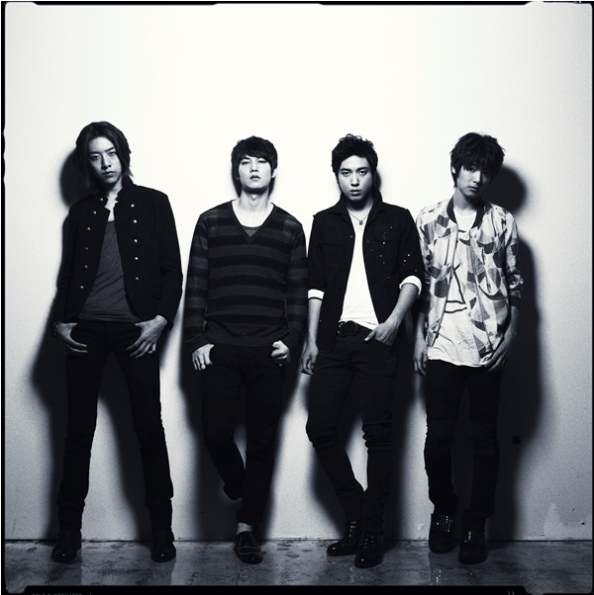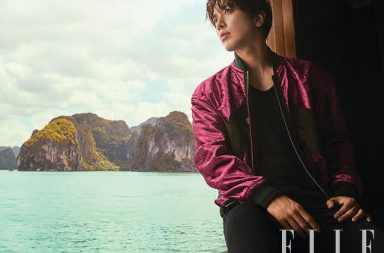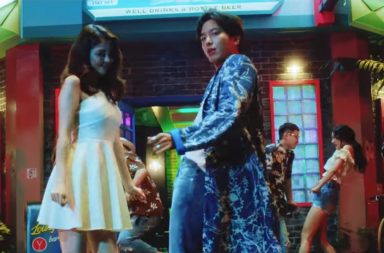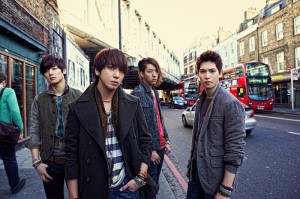 Welcome to another Seoulbeats Exchange, everyone!
Welcome to another Seoulbeats Exchange, everyone!
K-pop is populated with performance-based acts, dance groups who literally strut their stuff on stage, often to the point where acts of alternate styles are marginalised, especially within the international K-pop community. However, there are the occasional standouts: and few of them are bigger than CN Blue, FNC Entertainment‘s 4-piece band. Composed of leader and vocalist Jung Yong-hwa, guitarist Lee Jong-hyun, bassist Lee Jung-shin and drummer Kang Min-hyuk. The bassist was originally Kwon Kwang-jin, but he left before the group debuted and was replaced by now maknae Jung-shin.
I first discovered the existence of CN Blue thanks to leader and vocalist Yonghwa’s appearance in the drama You’re Beautiful, and while I’m not as big a fan as I could be, their biggest hits “I’m a Loner,” Love Girl” and the recent “Hey You” are familiar to me. The group came back on the 14th with a new mini-album and a career first in the first member-composed title track in Korean. Before the album dropped, I roped in Bethany, Fannie, Johnelle and Nicholas to talk more about the popular band.
1. CN Blue is active in both Korea and Japan; what, if any, are the differences you feel exist between the discographies for each market?
Bethany: I find that CN Blue’s Korean stuff tends to lean more towards pop-punk than their Japanese stuff. Perhaps that’s because they started in Japan, but it seems that they are more pressured to appeal to a broader base of fans in Korea. I’m more familiar with their Korean discographies than their Japanese ones, but I feel like they balance both styles pretty well. I’m partial to their first full-length album in Korea though (“Lies” is my jam!).
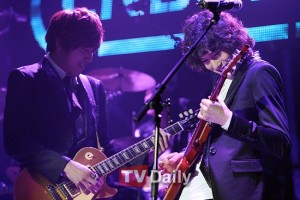 Fannie: I’ve covered this topic extensively when I wrote my previous Side B on CN Blue, but basically their overall sound and image is slightly more pop-ish in Korea as opposed to in Japan. This is in no small part due to the fact that FNC tends to ask outside songwriters (e.g. Lee Sang-ho and Kim Do-hoon) to write the Korean title tracks for CN Blue. If you look further down on the tracklist you’ll find that the Korean and Japanese discographies overlap quite a lot (oftentimes a song is penned by Yong-hwa or Jong-hyun and released in Japan first, and then shows up a few months later on a Korean album) but since the ‘sound image’ of a group is so greatly dominated by their promotional tracks, the flavor of the group in Korea is manufactured by FNC to blend in more easily with the pop landscape.
Fannie: I’ve covered this topic extensively when I wrote my previous Side B on CN Blue, but basically their overall sound and image is slightly more pop-ish in Korea as opposed to in Japan. This is in no small part due to the fact that FNC tends to ask outside songwriters (e.g. Lee Sang-ho and Kim Do-hoon) to write the Korean title tracks for CN Blue. If you look further down on the tracklist you’ll find that the Korean and Japanese discographies overlap quite a lot (oftentimes a song is penned by Yong-hwa or Jong-hyun and released in Japan first, and then shows up a few months later on a Korean album) but since the ‘sound image’ of a group is so greatly dominated by their promotional tracks, the flavor of the group in Korea is manufactured by FNC to blend in more easily with the pop landscape.
Johnelle: I think the differences in their discographies for each market reflects the markets themselves. I’m no expert on the Japanese market, but I think that while J-pop rules, a more rock sound is appealing to the masses. And since pop rules K-pop, FNC manufactures CN Blue’s sound in Korea. Fortunately, since CN Blue had been successful with their music and have been pushing their company for more control over their music, their new album coming out this week is mostly composed by the members. Most of my favorite songs from their past works have been Yong-hwa and Jong-hyun’s compositions so I am looking forward to what they have to offer with their new album.
2. “Idol band” is an unexpected term, but one that can be seen to fit CN Blue. How do you think CN Blue manages being seen as both a band and a male idol group?
Fannie: What makes CN Blue an ‘idol band’ is the way they run the promotional circuit — going on variety shows, dabbling in acting and MC-ing, etc., but they also make it clear whenever possible that they want to be known as an instrumental group rather than a dance group (which is what most boybands would be categorized as).
Johnelle: It’s definitely not easy being an idol band, as your musicianship is always questioned. If you weren’t into K-pop when CN Blue first debuted in Korea, you might not know this, but they had a really hard time in the beginning. Riding on the wave of popularity that Yong-hwa found with his breakout role in You’re Beautiful, CN Blue had much hype and success with their debut song “I’m a Loner.” Unfortunately for them that kind of seemingly instant success isn’t always met with positivity. There were lots of critics questioning them being a ‘real’ band especially since during most of their music show performances they had to play ‘unplugged.’ There were people (even sunbaes in the industry) who called them a fake band and when the plagiarism issue came up with their debut hit “I’m a Loner,” it just made matters worse.
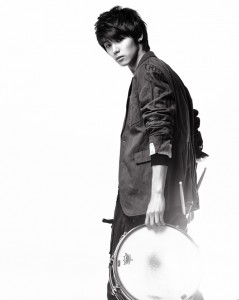 I distinctly remember watching a show where Min-hyuk was in tears over the accusations and it was the saddest thing ever because one of the thing I liked most about Min-hyuk was that he always seemed to have this look of pure joy every time they performed and he was playing his drums. The members had said that all they could do to prove themselves was work harder, develop as musicians and grow together as a band. And that has been the only way they have survived–after two years of continued success, I think they have finally quieted their critics. As someone who was fortunate enough to see them perform live in person, I can honestly say that they are awesome in concert.
I distinctly remember watching a show where Min-hyuk was in tears over the accusations and it was the saddest thing ever because one of the thing I liked most about Min-hyuk was that he always seemed to have this look of pure joy every time they performed and he was playing his drums. The members had said that all they could do to prove themselves was work harder, develop as musicians and grow together as a band. And that has been the only way they have survived–after two years of continued success, I think they have finally quieted their critics. As someone who was fortunate enough to see them perform live in person, I can honestly say that they are awesome in concert.
Nicholas: I think they manage to combine the strengths of idol groups (good looks, broad appeal, radio friendly songs) with what makes a usual band respectable (having a hand in composing music, ability to perform on stage). Ultimately though, I still think of them more as a pop-rock band, in the stylings of Maroon 5.
Possibly why the accusation of plagiarism and being a “poseur band”, as Johnelle mentioned earlier, could be due to how the concept of a band playing pop songs, with handsome members fronting variety shows, was still a rather foreign concept at that time. While I can understand the criticisms from an elitist point of view, it is mostly un-warranted. As long as fans know what they are getting into when they say they like “Idol Bands”, by not going on the “he’s so talented he plays his own songs” high horse, as well as marketing clearly knowing what they are selling to the public, I have no issues with the “Idol Band.”
3. CN Blue’s main competition in terms of idol bands is also their labelmate, F.T. Island. How does CN Blue manage its space in the industry alongside FT Island?
Bethany: It could be just me, but I feel like F.T. Island and CN Blue have very different styles. Sure, they’re both instrumental boy bands, but if you take a closer look at the songs each group produces, it’s very easy to distinguish F.T. Island’s songs from those of CN Blue. I don’t think the two bands consider themselves competitors, really, because they both have such solid fanbases.
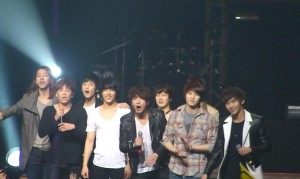 Fannie: I agree with Bethany, the two bands have managed to carve out slightly different styles and fanbases. I can certainly hear the difference between their songs especially in terms of the vocal signatures of their leaders. Do their niches overlap a bit? Certainly (Hong-ki once stated on Oh! My School half-jokingly and half out of frustration that FNC basically used F.T. Island as an experimental prototype for CN Blue, which Tony An then proceeded to relate to the way SM handled Shinhwa versus H.O.T.) but it’s not as if K-pop only has enough room for one four-membered idol boy band. I mean, look at how many five to seven membered idol boy groups with similar concepts that are on the scene and able to co-exist.
Fannie: I agree with Bethany, the two bands have managed to carve out slightly different styles and fanbases. I can certainly hear the difference between their songs especially in terms of the vocal signatures of their leaders. Do their niches overlap a bit? Certainly (Hong-ki once stated on Oh! My School half-jokingly and half out of frustration that FNC basically used F.T. Island as an experimental prototype for CN Blue, which Tony An then proceeded to relate to the way SM handled Shinhwa versus H.O.T.) but it’s not as if K-pop only has enough room for one four-membered idol boy band. I mean, look at how many five to seven membered idol boy groups with similar concepts that are on the scene and able to co-exist.
Johnelle: I actually believe there are a couple more idol bands out there besides FT Island: the maybe on permanent hiatus because of military service TRAX, the up and coming LEDApple who debuted the same year as CN Blue, and FNC’s girl idol band AOA. But I would say it is true that their biggest direct competition would appear to be F.T. Island. Although both are similar in scope, I believe that their music is different. CN Blue has a smoother sound and are more pop/rock based and F.T. Island is definitely more rock–their music is distinctly different from each other. In K-pop, fans tend to support acts from the same companies, which also helps.
CN Blue has also definitely gone more of the idol route than FT Island with each of its members branching out beyond music to enhance their individual careers.
Nicholas: After all these years, I find that they have been nicely differentiated. These days, F.T. Island does the more melo-dramatic works, while CN Blue is left with the more upbeat, hummable stuff. Also the groups differ conceptually, with F.T. Island dressing more like rock stars, with CN Blue going for the “school rock band” look (really, they are always rocking those suits).
It also helps that both groups have had established fan bases, with the “same same but different” concepts ensuring both fan bases would have given the other group support at some point of time. While such differentiation has done well to keep them both in business, one does wonder if FNC Music did hold each group back in some way, to ensure they do not encroach in each other’s musical territory. After all, F.T. Island used to do fun rock, and CN Blue look like they could try some dark concepts from time to time.
 4. Obligatory Yong-hwa question: Yong-hwa takes a lot of responsibility with composing, singing and representing the band, and he’s even taken a hand in composing for other artists (like Juniel). Having so much on his plate, is there any worry of him burning out? Or of his bandmates being left in the dust?
4. Obligatory Yong-hwa question: Yong-hwa takes a lot of responsibility with composing, singing and representing the band, and he’s even taken a hand in composing for other artists (like Juniel). Having so much on his plate, is there any worry of him burning out? Or of his bandmates being left in the dust?
Nicholas: Not really. I think after a while, there is a limit to what he can do. I must admit to not being a fan of his stiff acting, or seeing him on TV way too often. In some ways though, this would also be a good thing for him (to learn what he does less well, and prevent burn out from being everywhere) and a good thing for everyone else (to step up and take some of the promotional load off him). The good thing is that each member has a clear identity within the group, such that their names and faces are easy to remember, for me at least; so yes, I can see them getting some success individually.
Bethany: If the K-pop scene ever leaves Jong-hyun behind in the dust, I might actually lock myself up in my room and cry out of rage. Just kidding, but while Yong-hwa gets a lot of the spotlight and is the face of his band, the other members have quite a bit to show for as well. Jong-hyun has proved that he has the voice and the talent for songwriting along Yong-hwa. Jung-shin’s kind of a boss at bass and a riot on variety. And adorable Min-hyuk already has one drama role under his belt (who can forget his nerdy cuteness in Heartstrings?). I think Yong-hwa’s passion for music will keep him from burning out, and the other members definitely get recognition here and there (though not as much as I would like).
Fannie: Although I adore Jong-hyun (the most underrated person ever) to bits and pieces, it was a smart move by FNC to switch Yong-hwa into the position of ‘leader’ when they made their debut in Korea. Yong-hwa definitely shouldered most of the workload from the outset but the attention was well-deserved — thank god there was at least one person in the group that was less introverted than the others — but the other members are slowly but surely finding their footing in the industry and the public eye in other ways, such as acting and modelling, that don’t necessarily require an outgoing personality. I’m seeing things start to balance out, so I think it can only get better and better from here on out.
Johnelle: Yong-hwa’s success and popularity that came with his appearance on You’re Beautiful had a major affect on the group’s popularity. And in K-pop you gotta make the most of your time at the top so for the first 18 months of their career, Yong-hwa was the face, voice, almost everything of CN Blue. They got him on every variety show appearance they could, on We Got Married with a member of SNSD–he was just everywhere. Eventually, with their popularity and success firmly entrenched, the other members each branched out into other endeavors like modeling and acting. And that’s when Yong-hwa negotiated (demanded) a break. For the last two months he’s been on hiatus concentrating on his health and composing while taking a much deserved break. Now that each of the members have been gaining popularity individually and the band has reached a high level of popularity and success, I think a lot of pressure has been taken off of Yong-hwa.
The evolution of CN Blue in the three or so years since their Korean debut is really interesting to see. To many fans not following CN Blue, it does appear as though it’s all about Yong-hwa; but, as Fannie mentioned, FNC acted wisely in capitalising on Yong-hwa’s then-newfound popularity, which has carried them a fair way since debut. It’s easy to “hate” on someone for the fact that they are more exposed to the public than the other members, but CN Blue shows that this method of promotion does help. Though all members of the band have undoubtedly worked hard to get to where they are, CN Blue rose to prominence on Yong-hwa’s back, as diversification is the name of the game in K-pop; and now that the other members have also branched out, the balance of representation can only improve from here on.
It really is a shame that CN Blue and other bands are prevented from playing live on music shows, though; hand-syncing is generally employed by music shows for ease, and this robs bands of the chance to display their full talents, leaving only the singer to carry the burden of proving their band’s credentials. It can only be hoped this culture is changed in the long run, because although CN Blue copes with this hurdle, it only serves to restrict other bands, and thus the lanscape of K-pop itself.
What are your thoughts on CN Blue, readers? What do you think of the band’s music and growth? What are your favourite Korean and Japanese songs? Share your thoughts below!
(FNC Entertainment, TV Daily)
